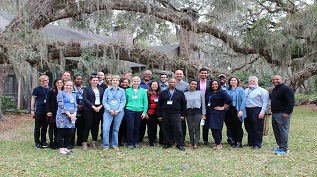Dedicated Community Drives Socioeconomic Change in the Rural South
“How many of you grew up in a rural community?” Melanie Edwards, CEO of Mobile Metrix, asked the group. Fifteen hands went up. “And how many of you still live there?” Melanie asked. Fourteen hands went down. Rural flight was a pressing issue, and in order to spark investment in these neglected communities, it was our goal as a group to identify the key challenges, potential opportunities, and push for new and innovative investment opportunities.

In partnership with Sapelo Foundation, a private family foundation supporting low-resource regions of Georgia, Impact Experience brought together 30 people representing impact investing, entrepreneurship, education, coastal restoration and sustainable agriculture to tackle key challenges faced by rural communities. By giving voice to community leaders, we aimed to collaboratively develop solutions and catalyze change in rural Georgia.
Christine Reeves, Executive Director of Sapelo Foundation, explained, “We aim to convene smart, talented, and dedicated people around creating a game plan for a specific, actionable goal… The expectation is to start putting that game plan into action and bringing the goal to fruition.”
Rather than solution-building from the outside, we took an inside-out approach, highlighting the voices of local community members in order to understand the complexity of challenges, and co-developing solutions collectively as a broader community committed to catalyzing change in rural Georgia. “There’s something really powerful about bringing together a diverse group of people with different knowledge and experience. Our goal is to break down barriers, and really connect on a human level on issues that affect communities most,” explained Jenna Nicholas, Co-founder and CEO of Impact Experience.

Community members representing rural Georgia and the regional South at-large emphasized the importance of the structural and historical roots of today’s challenges. Rich McCline, Senior Public Service Associate at The J.W. Fanning Institute for Leadership Development,explained how the education system in Georgia continues to be segregated by race and class, affecting the quality of education and resources available to African American students. This catalyzed discussions on potential solutions that could provide financial resources to improve school systems as well as provide broadband infrastructure to close the digital literacy gap.
Other discussions centered around issues of equitable and sustainable agriculture. “How do we make the agriculture sector a more inclusive economic opportunity?” Tamara Jones, Executive Director of Southeastern African American Farmers Organic Network (SAAFON), asked the group. According to Tamara, African American farmers have difficulties retaining rights to land and receiving support. Key questions focused on how to confront issues of financial exclusion in banking, lending, and holding. Stamping out racism and empowering farmers to use data technologies were among the many opportunities participants identified collaboratively as a way forward toward inclusive growth.
For others, the key issue lied in how to connect African American heritage with the land and future economic opportunities. For Albert George, a resident of South Carolina, the issue of family tradition is entrenched in his heritage. He shared a story about how his family roots shaped his understanding and connectivity to the coastal lands:
“Both my mother and father are from the coastal region along the Gulf – we Gullah Geechee are descendants of slaves that came through Charleston and Savannah, some of the most entrenched racist parts of the world. People who looked like me came from a ‘slave label’ – it speaks to the agrarian capabilities and cheap labor. There’s so much wealth, but in order to generate that wealth, you need access to cheap or free labor. When people think of the south, they think cotton. But along the coast, it was rice. So people from West Africa were recruited for being water engineers – but you don’t hear about this story! So, being a marine scientist is part of my identity. Your narrative and who you are is most important.”

These powerful stories not only revealed how deeply rooted contemporary challenges were, but also illuminated innovative ways in which private capital, philanthropy, and impact investing could take shape to improve these conditions. For example, the interconnectedness of heritage, land, and economic growth sparked in-depth discussions on how to make active investments locally and create jobs in rural Georgia. Participants pushed for a re-balancing of the distribution of assets in Georgia, explaining how the state should capitalize $500 million in land trust, and use those assets to support struggling families that cannot pay their rent or mortgage.
Translating opportunities into action is a crucial step toward catalyzing change. During the last day of the convening, we all made individual commitments based on our area of expertise, social network, and resources. Some of the commitments that participants actively made include:
- Conduct research on tools for education nonprofits in Georgia around impact investing
- Support digital literacy in rural Georgia
- Offer one full scholarship to a 10th or 11th grade student in a rural community who is an agent of change
- Develop national resource map of rural focused entrepreneurial landscape
- Partner with Code for Savannah on a Build-a-thon as a state-wide issue
As next steps, we will hold a follow-up conference call to check-in with our Georgia participants on their ongoing work, and to share updates on new partnerships, initiatives, and investment opportunities that have arisen as a result of the convening. In the long-term, we plan to create a hub in the rural South to continue tackling issues in the region.
Christine Reeves remarks, “We are excited to see what will come from the Georgia Impact Experience Musgrove Action Retreat, as we seek important mission and impact investing opportunities in rural Georgia.”
